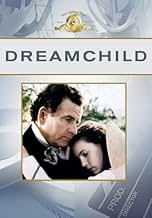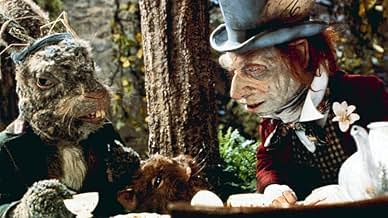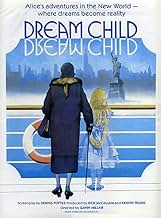IMDb RATING
6.6/10
1.9K
YOUR RATING
Ian Holm is children's author Lewis Carroll in this poignant fantasy-drama set in 1930s New York and populated by the fabulous special effects creatures of Muppet master Jim Henson.Ian Holm is children's author Lewis Carroll in this poignant fantasy-drama set in 1930s New York and populated by the fabulous special effects creatures of Muppet master Jim Henson.Ian Holm is children's author Lewis Carroll in this poignant fantasy-drama set in 1930s New York and populated by the fabulous special effects creatures of Muppet master Jim Henson.
- Nominated for 2 BAFTA Awards
- 7 wins & 6 nominations total
- Director
- Writer
- All cast & crew
- Production, box office & more at IMDbPro
Featured reviews
"Dreamchild" is a dark yet beautiful tale of an elderly woman haunted by the famous author who adored her as a child. It deals with love and fear, memories and the past, and the final recociliation of the two. Each character is succinctly and sympathetically drawn, from Lucy the young and naieve maid of the elderly Victorian Mrs. Alice Hargreaves (nee Liddell), who, on her first visit to America, cannot understand the intense attention given to her because of her connection to Lewis Carroll/Rev. Dodgson. The movie seamlessly shifts from the present (New York during the Despression) to the past (Victorian England at Oxford University). Real fans of Alice in Wonderland may object to this depiction of Wonderland characters in a harsher, angrier light; such as when the 80 year old Mrs. Hargreaves meets the Mad Hatter. The Reverend Dodgson does not stand accused as Michael Jackson or like some members of the clergy today, but Mrs. Hargreaves does ask "My mother destroyed all his letters. Why would she do that?" But the younger Alice, when asked by her mother, "Why on earth would he say that to you?" answers straighforwardly, "Because he loves me, of course." A thought provoking film worth seeing if you can find it.
Let me start by simply saying that the reaction I had viewing this film was unlike any other viewing experience I can recall. Although I found it well written and produced, I was so disappointed by the 2/3's point that I almost stopped watching. Yet by the end I was absolutely embracing the whole thing. So if you are a Lewis Carroll fan keep an open mind and watch the whole thing, you may find the whole much greater than the sum of its parts. And you may even find yourself willing to accept the historical fiction as necessary to better tell the story.
I suppose a large part of my initial negative reaction was due to the film's puzzling failure to capture a fundamental aspect of Alice Liddell's childhood personality. Alice spent much of her time in "Wonderland" being p .d off; at the illogic, the rudeness, and the selfishness of the characters she met there. Both Alice's were proper and confident little Victorian girls who took themselves very seriously. I am sure that this was one of many "Real Alice" personality traits that Carroll transplanted to his "Wonderland" Alice. Often amused by her reactions of irritation and frustration, he constructed many of the story elements with the intention of getting indigent reactions from Alice and her sisters. I had hoped that this connection would be made by the film and was disappointed that it was not explored, although in retrospect you could argue that the older Alice's reactions to the characters she meets in America are identical to Alice's reactions to the characters in Wonderland. That the film does not explore my pet topic was disappointing but ultimately not fatal.
In all other respects the portrayal of young Alice Liddell was excellent. Amelia Shankley turned in a fine performance. She is clearly the best film Alice so far and it is a shame that they did not star her in an actual Alice film right after "Dreamchild" was completed. And Coral Browne was equally excellent as the older Alice.
This film is about how Alice's mother (who felt her daughter could find much better candidates for marriage as she moved into her teens) essentially poisoned her memories of Dodgson, leading her to believe that there was something wrong about his feelings for her (when in fact he was just a childlike personality who loved her more than his other child friends, but always with a shy innocence). It is also about the guilt the older Alice still feels over abandoning him just as she entered her teens, especially after all the innocent kindness he had shown. She is in denial about her affection for Dodgson and irritated because all the attention of his centennial is forcing her to recall those long-suppressed years of her life. And finally she feels that since she was not actually the little heroine who exhibited so much courage in "Wonderland", she does not deserve her sudden celebrity status. In her view she was catapulted into fame "by simply doing nothing". Remember that Wonderland Alice is arguably the bravest literary heroine of all time.
What ultimately redeems the film is the climatic scene in the hall of Columbia University. Alice Liddell flashes back to a scene late in her relationship with Dodgson, a symbolic scene meant to represent the end of their relationship. She had outgrown him at this point in her life and she laughs and humiliates him as he attempts to sing his Lobster Quadrille song to the three Liddell sisters and their male suitors. When her mind returns to the present she hears the Columbia University orchestra and glee club performing the same song. She realizes that the story which she once rejected was in fact his personal tribute to her and that even after all these years each little detail of his creation is admired throughout the world. At this point she finally gets it. She goes back to the symbolic scene as her older sister Lorina reads the final paragraph from the Wonderland book, the one in which Dodgson reveals the reason he made up the story. Then the child Alice walks over, kisses Dodgson in apology, and places her head on his chest (an omission for which she has long felt guilty). Then we are back in the hall and find that in place of her prepared speech she has read this same passage to the now applauding crowd.
The point is that she finally understood that the story was a gift to her and to future generations of children, that she had inspired the story and had been the model for his heroine. With this realization came the final gift of knowing that the virtues Mr. Dodgson gave his heroine: innocence, courage, curiosity, wonder, kindness, intelligence, courtesy, humor, dignity, and a sense of justice; were virtues he credited to the real Alice.
It is hard to imagine a better scene (or sequence of scenes) than the climatic one detailed above. Film and video cannot hope to compete with books in communicating thoughts. But with the right players film can visually communicate moments of character realization and transformation to a degree much more subtle and personal than what any author can write. This is the real magic of film and acting for the camera. In the end these climatic moments say everything that needs be said about the relationship between Dodgson and his "dreamchild". A truly great cinematic moment and my all-time favorite.
I suppose a large part of my initial negative reaction was due to the film's puzzling failure to capture a fundamental aspect of Alice Liddell's childhood personality. Alice spent much of her time in "Wonderland" being p .d off; at the illogic, the rudeness, and the selfishness of the characters she met there. Both Alice's were proper and confident little Victorian girls who took themselves very seriously. I am sure that this was one of many "Real Alice" personality traits that Carroll transplanted to his "Wonderland" Alice. Often amused by her reactions of irritation and frustration, he constructed many of the story elements with the intention of getting indigent reactions from Alice and her sisters. I had hoped that this connection would be made by the film and was disappointed that it was not explored, although in retrospect you could argue that the older Alice's reactions to the characters she meets in America are identical to Alice's reactions to the characters in Wonderland. That the film does not explore my pet topic was disappointing but ultimately not fatal.
In all other respects the portrayal of young Alice Liddell was excellent. Amelia Shankley turned in a fine performance. She is clearly the best film Alice so far and it is a shame that they did not star her in an actual Alice film right after "Dreamchild" was completed. And Coral Browne was equally excellent as the older Alice.
This film is about how Alice's mother (who felt her daughter could find much better candidates for marriage as she moved into her teens) essentially poisoned her memories of Dodgson, leading her to believe that there was something wrong about his feelings for her (when in fact he was just a childlike personality who loved her more than his other child friends, but always with a shy innocence). It is also about the guilt the older Alice still feels over abandoning him just as she entered her teens, especially after all the innocent kindness he had shown. She is in denial about her affection for Dodgson and irritated because all the attention of his centennial is forcing her to recall those long-suppressed years of her life. And finally she feels that since she was not actually the little heroine who exhibited so much courage in "Wonderland", she does not deserve her sudden celebrity status. In her view she was catapulted into fame "by simply doing nothing". Remember that Wonderland Alice is arguably the bravest literary heroine of all time.
What ultimately redeems the film is the climatic scene in the hall of Columbia University. Alice Liddell flashes back to a scene late in her relationship with Dodgson, a symbolic scene meant to represent the end of their relationship. She had outgrown him at this point in her life and she laughs and humiliates him as he attempts to sing his Lobster Quadrille song to the three Liddell sisters and their male suitors. When her mind returns to the present she hears the Columbia University orchestra and glee club performing the same song. She realizes that the story which she once rejected was in fact his personal tribute to her and that even after all these years each little detail of his creation is admired throughout the world. At this point she finally gets it. She goes back to the symbolic scene as her older sister Lorina reads the final paragraph from the Wonderland book, the one in which Dodgson reveals the reason he made up the story. Then the child Alice walks over, kisses Dodgson in apology, and places her head on his chest (an omission for which she has long felt guilty). Then we are back in the hall and find that in place of her prepared speech she has read this same passage to the now applauding crowd.
The point is that she finally understood that the story was a gift to her and to future generations of children, that she had inspired the story and had been the model for his heroine. With this realization came the final gift of knowing that the virtues Mr. Dodgson gave his heroine: innocence, courage, curiosity, wonder, kindness, intelligence, courtesy, humor, dignity, and a sense of justice; were virtues he credited to the real Alice.
It is hard to imagine a better scene (or sequence of scenes) than the climatic one detailed above. Film and video cannot hope to compete with books in communicating thoughts. But with the right players film can visually communicate moments of character realization and transformation to a degree much more subtle and personal than what any author can write. This is the real magic of film and acting for the camera. In the end these climatic moments say everything that needs be said about the relationship between Dodgson and his "dreamchild". A truly great cinematic moment and my all-time favorite.
Very moody and stylish movie - whose plot switches between three venues - the 1860s when Lewis Carroll introduced the Wonderland tales to young Alice and her sisters - the 1930s when the aged Alice visited the U.S. months before her death - and the surreal world of the Alice in Wonderland stories with story characters portrayed by wickedly designed Jim Henson puppets
Four actresses stand out in my memory - Coral Browne as the starchy old Alice - Amelia Shankley as the young selfcentered Alice - Nicola Cowper as old Alices companion and love interest to the young American reporter played by Peter Gallagher - and - in a small role - Caris Corfman as a wistful newspaper reporter - in addition to many fine British and American actors
My only gripe is Ian Holm's age - Holm was in his early 50s when he portrayed Lewis Carroll - who was closer to 30 when he first told the stories - there were concerns in his time about the purity of his interest in his child friends and photography subjects - such as Alice - Ian Holm brings that frightfully to life
This film took great care in evoking the respective time periods - using beautiful set designs and photography - as a result - the movie is itself an exotic journey into other times and places - with Alice still as protagonist
Four actresses stand out in my memory - Coral Browne as the starchy old Alice - Amelia Shankley as the young selfcentered Alice - Nicola Cowper as old Alices companion and love interest to the young American reporter played by Peter Gallagher - and - in a small role - Caris Corfman as a wistful newspaper reporter - in addition to many fine British and American actors
My only gripe is Ian Holm's age - Holm was in his early 50s when he portrayed Lewis Carroll - who was closer to 30 when he first told the stories - there were concerns in his time about the purity of his interest in his child friends and photography subjects - such as Alice - Ian Holm brings that frightfully to life
This film took great care in evoking the respective time periods - using beautiful set designs and photography - as a result - the movie is itself an exotic journey into other times and places - with Alice still as protagonist
This is a stunning film, there have been all kinds of rumors and stories about the Rev. Charles Dodgeson and just who he was. This film lovingly and sadly portrays a what-if tale about Alice Liddell, the real Alice, of his famous books and what Victorian society did to her memories of this delightful man. I am not a member of the camp that thinks Dodgeson had a unnatural love for little children I find it preposterous and slanderous to say the least. This movie portrays him brilliantly and Ian Holm is such a superb actor you really feel sad for the lonely man with no wife and children of his own who writes these wonderful tales only to be suspected of unacceptable feelings for the little girl. This movie gives us all that with some wonderfully creepy Wonderland sequences by Hensen's creature shop. Simply marvelous!
In order to fully appreciate this movie a knowledge of both Alice Liddell and Lewis Carroll is recommended. For a film associared with Dennis Potter--who'd previously written an Alice in the 60s...you might expect smut but there's none here. Its all done very tastefully so it would disappoint anyone looking for titillation. Jane Asher has a minor role as Mrs.Liddell,shown as a chaperone on the famous river outing.She played Alice herself in the early 60s for a couple of studio casts. Though its artistic license to suggest Mrs.Hargreaves took along her maid in reality there were two others,one of which was her granddaughter. I liked the scene where Mrs.Hargeaves read out a commercial---for which they'd pay her 1000s of dollars: ""once when I was a little girl I fell down a rabbit hole then picked up a bottle with a label on which said DRINK ME.But today I look for a bottle which says CHARDONAY"
Did you know
- TriviaBecause its American theatrical release was limited, and she was extremely proud of this movie, Coral Browne went on a self-funded promotional tour.
- GoofsDuring the tea dance Jack and Lucy waltz to "I Only Have Eyes For You." The scene is set in 1932, but the song was not written until 1934.
- Quotes
Alice Hargreaves: That's quite intolerable. It would be difficult enough at my age to be what I once was, but utterly impossible to be what I never was.
- ConnectionsFeatured in At the Movies: The Trip to Beautiful/Ran/Clue/Dreamchild (1985)
- SoundtracksAll of Me
(uncredited)
Music by Gerald Marks
Lyrics by Seymour Simons
Performed by a vocalist with the ship's band
- How long is Dreamchild?Powered by Alexa
Details
Box office
- Budget
- £4,000,000 (estimated)
- Gross US & Canada
- $1,215,923
- Opening weekend US & Canada
- $5,425
- Oct 6, 1985
- Gross worldwide
- $1,215,923
Contribute to this page
Suggest an edit or add missing content






















